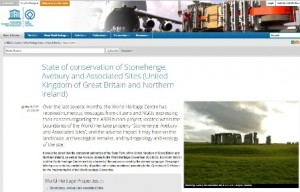UNESCO responds to our concerns
UNESCO’s World Heritage Centre has acknowledged the many messages received from citizens and non-governmental organisations about the Stonehenge tunnel proposal and has given an assurance that the relevant UK Government departments and bodies (which include Historic England (formerly English Heritage)) are also aware of our concerns.
We thank our supporters for writing to UNESCO, eliciting this response which we warmly welcome. We hope that supporters, like us, will feel encouraged that the project is being monitored according to UNESCO’s Operational Guidelines for the Implementation of the World Heritage Convention.
We believe that paragraphs 96–119 of the Operational Guidelines are particularly relevant, in view of the current threat of road engineering affecting the Stonehenge landscape. These paragraphs set out guidelines for the protection and management of World Heritage Sites (WHS). They explain that:
“All properties inscribed on the World Heritage List must have adequate long-term legislative, regulatory, institutional and/or traditional protection and management to ensure their safeguarding.” (Para.97)
“Each nominated property should have an appropriate management plan or other documented management system which must specify how the Outstanding Universal Value of a property should be preserved, preferably through participatory means.” (Para 108)
“The purpose of a management system is to ensure the effective protection of the nominated property for present and future generations.” (Para.109)
The key point made here – and in the World Heritage Convention – is that it is the whole WHS or “property” that is to be safeguarded, not just parts of it.
The first Stonehenge Management Plan was published by English Heritage in 2000 and revised in 2009. This week sees the launch of the first combined management plan for Stonehenge, Avebury and Associated Sites WHS.
The Plan, in its “Vision” commits its supporters and users to
“. . . work together to care for and safeguard this special area and provide a tranquil, rural and ecologically diverse setting for it and its archaeology. This will allow present and future generations to explore and enjoy the monuments and their landscape setting more fully.”
We hope that the Government and its advisers will consider carefully its commitments under the World Heritage Convention, and UNESCO’s Operational Guidelines which provided relevant advice for the new WHS Management Plan. Re-examination of these three documents ought to lead the Government to a change of heart and a better outcome for the Stonehenge WHS than that currently proposed.
Please share

